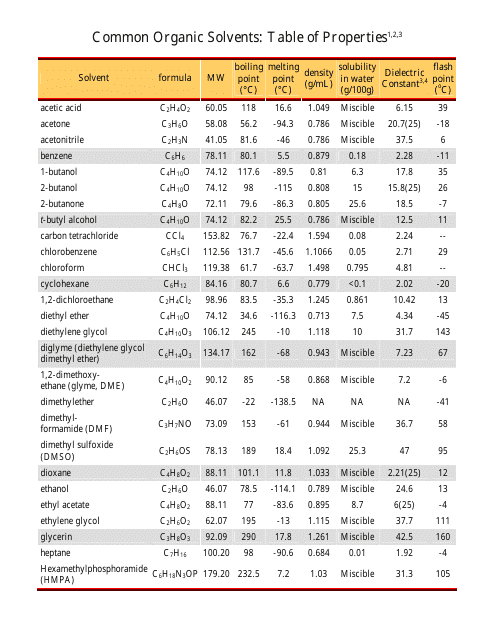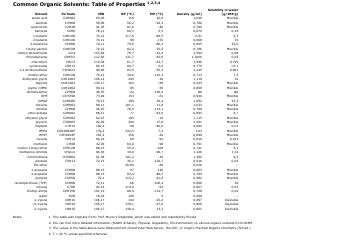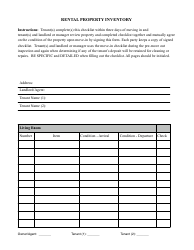Common Organic Solvents Table of Properties - Yellow
The Common Organic Solvents Table of Properties - Yellow is a reference document that provides information about the properties of various organic solvents. It is used to identify and select suitable solvents for different applications, such as in chemical reactions, cleaning, and extraction processes.
FAQ
Q: What is a common organic solvent?
A: A common organic solvent is a liquid substance that can dissolve or disperse other substances.
Q: What are some examples of common organic solvents?
A: Some examples of common organic solvents include acetone, ethanol, methanol, and toluene.
Q: What are the properties of organic solvents?
A: Organic solvents have properties such as boiling point, melting point, density, and polarity.
Q: What is the boiling point of organic solvents?
A: The boiling point of organic solvents varies depending on the specific solvent, ranging from low to high temperatures.
Q: What is the melting point of organic solvents?
A: The melting point of organic solvents varies depending on the specific solvent, ranging from low to high temperatures.
Q: What is the density of organic solvents?
A: The density of organic solvents varies depending on the specific solvent, ranging from low to high values.
Q: What is the polarity of organic solvents?
A: The polarity of organic solvents can vary, with some solvents being polar and others being nonpolar.
Q: Why are organic solvents used?
A: Organic solvents are used for various purposes such as cleaning, degreasing, extracting, and dissolving substances.
Q: Are organic solvents safe to handle?
A: Some organic solvents can be toxic, flammable, or harmful if not handled properly. It is important to follow safety precautions when using organic solvents.
Q: Can organic solvents be used in food or drink?
A: No, organic solvents should not be used in food or drink as they can be harmful if ingested.
Q: Can organic solvents be used in cosmetics?
A: Some organic solvents are used in cosmetics, but their use is regulated to ensure safety.
Q: Can organic solvents be used as fuels?
A: Some organic solvents, such as ethanol, can be used as fuels.
Q: Can organic solvents be used in pharmaceuticals?
A: Organic solvents are used in the production and formulation of pharmaceuticals.
Q: Are all organic solvents volatile?
A: Not all organic solvents are volatile. Some solvents have low volatility, while others may evaporate quickly.
Q: Can organic solvents dissolve water?
A: Some organic solvents can dissolve water, while others are immiscible with water.
Q: What precautions should be taken when using organic solvents?
A: Precautions when using organic solvents include proper ventilation, wearing appropriate protective equipment, and storing solvents in a safe manner.








